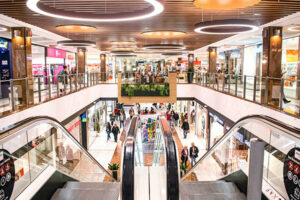By Stefan Sjöstrand
Sustainability is arguably more important to businesses and consumers today than ever before. Well-publicized public movements that call for better international approaches to dealing with climate change, plastic pollution, and loss of biodiversity have been inspirational and have recently gained significant traction. There is widespread agreement that not enough is being done to protect the environment and that the same old methods just will not cut it anymore. What does that mean for retail real estate?
In our view, creating a more sustainable world requires leadership, and businesses, governments, and community organizations must be prepared to take that lead. This particularly applies to owners of retail-led destinations, like ours, that are visited by millions of people. It is our responsibility to drive behavioral change and to help make sustainable living an easy choice for our customers. As a well-resourced business, we have the power to make a difference and to support individuals in doing so as well.
Ingka Centres surveyed 14,000 people across 14 countries with respect to their attitudes toward sustainability. We found that 90% were willing to change their behavior in order to combat climate change, but many, ultimately, failed to make any changes. Why? The main reasons revolved around the fact that they were unaware of what they could do, they were not sure whether they could make a difference, or they believed change would prove too difficult or too expensive. This clearly demonstrates the importance organizations have when it comes to helping individuals drive change.
Encouraging Recycling, Repair, Reuse, Re-selling, and Sharing
Of course, this is not without challenges. It would be easy to introduce any number of sustainability initiatives across our “meeting places”. Finding the right ones, in other words, those that would actually work for our customers, tenants, and wider stakeholders, is far more difficult. Sure, our customers genuinely want to help the environment – but not always at the expense of price, quality, or convenience. Our meeting places are for “the masses”, so the sustainability features we introduce cannot be focused on luxury, or reserved for those who are better off. We do not, for example, see making parking garages expensive in an effort to reduce car usage as a viable or fair option.
However, we are introducing schemes that encourage recycling, repair, reuse, re-selling, and sharing, and are working with our partners to deliver them. For example, at our MEGA Novosibirsk center in southern Russia, our Urban Farming project enables us convert food waste from the mall’s restaurants to bio-fertilizers for vertical farming in a fully circular set up. Many of our centers also offer schemes that help visitors recycle, including waste sorting stations where people can bring waste from their homes to recycle. We are also looking at how we can work with local communities to identify grassroots movements that we can support by both providing the necessary facilities and by promoting them through our own media channels.
As a real estate developer, sustainability must also be at the top of our agenda when embarking on new projects or upgrading existing ones. In 2018, we announced a new strategic vision to invest €5.8 bn to start new projects, enter new markets, and upgrade our existing portfolio for a more omni-channel world. This is all part of our effort to transform our business in order to create new mixed-use destinations at which people will want to shop, socialize, and relax long into the future. This approach includes taking our “meeting place” concepts to city centers for the first time, as our customers increasingly reside in city centers.
Striving for Zero Waste
Our Ingka People and Planet Positive strategy reflects our sustainability agenda until 2030, and new urban meeting places are being designed around it. It focuses on healthy and sustainable living as well as being circular, climate positive, and inclusive. It has detailed commitments; for example, we are striving for zero waste, and we want to be 100% circular and climate positive. Every new project will be developed and operated to be as sustainable as possible – through smart design. We also aim to reduce emissions resulting from co-worker and customer travel by 50% by 2030. Our downtown location and easy accessibility via public transport and by foot alone will have a big impact.
A “live” example is our first urban mixed-use project in Shanghai. We are using green technology to improve air quality and water quality, and to reduce waste – along with introducing new public spaces. This is all very important in a large city like Shanghai, and we are proud to be working towards achieving LEED1 and WELL certifications for the project.
We are also working with and following IKEA retail in our move towards becoming more climate positive. For example, in Portugal, our wind turbines generate more renewable electricity than we consume at our IKEA stores and Ingka Centres meeting places. Air source heat pumps provide renewable heating and cooling to IKEA stores with no greenhouse gas emissions, and in all five Portuguese IKEA stores, energy efficient lights use 25% less electricity. These are the kinds of features we are or will be incorporating at our meeting places.
It is time for our industry to embrace sustainability issues wholeheartedly. Retailers are rightly being driven by their customers to become more environmentally friendly – a recent survey conducted by Accenture found that 42% of consumers would “step away” from brands that do not match their social and environmental values. H&M recently announced that all packaging would be designed to be reusable, recyclable, and combustible by 2025. Sustainability is becoming a prerequisite for retailers, and they will increasingly expect landlords to provide spaces, environments, and initiatives that help them deliver their own commitments to customers.
What is certain is that those of us who embrace environmentalism will generate benefits for the planet, our customers, and our businesses.
About the author







